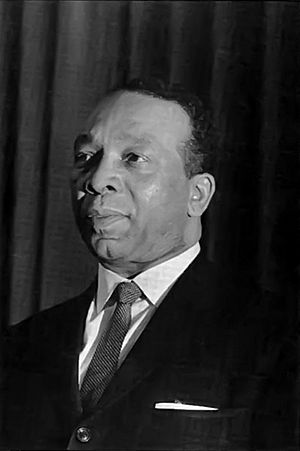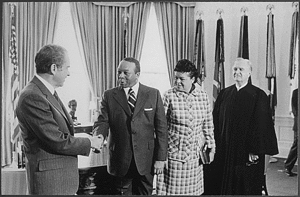Walter Washington facts for kids
Quick facts for kids
Walter Washington
|
|
|---|---|
 |
|
| Mayor of the District of Columbia | |
| In office January 2, 1975 – January 2, 1979 |
|
| Preceded by | Himself (Mayor-Commissioner) |
| Succeeded by | Marion Barry |
| Mayor-Commissioner of the District of Columbia | |
| In office November 7, 1967 – January 2, 1975 |
|
| President | Lyndon B. Johnson Richard Nixon Gerald Ford |
| Preceded by | Walter Nathan Tobriner (President of the Board of Commissioners) |
| Succeeded by | Himself (Mayor) |
| Personal details | |
| Born |
Walter Edward Washington
April 15, 1915 Dawson, Georgia, U.S. |
| Died | October 27, 2003 (aged 88) Washington, D.C., U.S. |
| Resting place | Lincoln Memorial Cemetery (Suitland, Maryland) |
| Political party | Democratic |
| Spouses |
Bennetta Bullock
(m. 1942; died 1991)Mary Burke
(m. 1994) |
| Children | 1 |
| Education | Howard University (BA, LLB) |
Walter Edward Washington (born April 15, 1915 – died October 27, 2003) was an important American public servant and politician. He was the chief leader of Washington, D.C. from 1967 to 1979. First, he was the only Mayor-Commissioner from 1967 to 1974. Then, he became the first elected Mayor of the District of Columbia from 1975 to 1979.
Walter Washington was the first African-American mayor of a major city in the United States. In 1974, he became the first mayor of Washington, D.C., to be chosen by popular vote since 1871. This happened after Congress passed a law giving the capital more local control. Washington won the first mayoral election in 1974 and served until 1979.
Contents
Early Life and Family Background
Walter Washington's great-grandparents were enslaved people. He was born in Dawson, Georgia. His family moved North during the Great Migration. Walter grew up in Jamestown, New York, where he went to public schools.
He studied at Howard University, earning a bachelor's degree. He later earned a law degree from Howard University School of Law. He was also a member of the Omega Psi Phi fraternity.
Washington married Bennetta Bullock, who was an educator. They had one daughter, Bennetta Jules-Rosette, who became a sociologist. Bennetta Washington also became a director of the Women's Job Corps. She was the First Lady of the District of Columbia when Walter was mayor. She passed away in 1991.
Walter Washington's Career Journey
After finishing his studies at Howard in 1948, Walter Washington began working for D.C.'s Alley Dwelling Authority. This agency helped with housing. He worked there until 1961.
In 1961, President John F. Kennedy chose him to be the Executive Director of the National Capital Housing Authority. This was the main housing department for Washington, D.C. At that time, Congress managed the city. In 1966, Washington moved to New York City. There, he led the larger Housing Authority under Mayor John Lindsay.
Leading Washington, D.C.
Serving as Mayor-Commissioner (1967-1974)
In 1967, President Lyndon B. Johnson changed how Washington, D.C., was run. Before, three commissioners had managed the city since 1871. President Johnson created a new government with one main commissioner, an assistant commissioner, and a nine-member city council. The president appointed all of these leaders.
President Johnson appointed Walter Washington as the Commissioner. This role was soon called "Mayor-Commissioner." Walter Washington became the first African-American mayor of a major American city.
When he took office, Washington, D.C., faced many challenges. There were tensions between different groups of people. Also, some members of Congress were not supportive of the city's new leadership.
In April 1968, Washington faced serious riots after the assassination of Martin Luther King Jr.. Walter Washington refused to use violence to stop the riots. Instead, he walked through the city himself. He asked angry young people to go home and help those who had been affected. Many people believe his actions helped prevent more widespread problems in the area.
Republican President Richard Nixon kept Washington in his role after being elected president in 1968. In 1971, the United States Department of Justice tried to stop a protest on Pennsylvania Avenue. Walter Washington went to the White House and asked President Nixon to allow the demonstration. The president agreed, and 250,000 people marched peacefully.
Becoming the Elected Mayor (1975-1979)
On December 24, 1973, Congress passed a new law. This law, called the District of Columbia Self-Rule and Governmental Reorganization Act, allowed D.C. residents to elect their own mayor and city council. This was a big step for "home rule," meaning the city could govern itself more.
In early 1974, Walter Washington campaigned to become the Democratic candidate for mayor. Since Washington, D.C., was mostly Democratic and had a large Black population, it was expected that the winner of the Democratic primary would become the city's first elected mayor since 1871.
Washington ran against six other candidates. The main competition was between Washington and Clifford Alexander Jr.. Washington won the close race by 4,000 votes. As expected, he won the general election in November by a large margin.
Home rule officially began when Washington and the new city council were sworn into office on January 2, 1975. This was the city's first elected government in over 100 years. Supreme Court Justice Thurgood Marshall swore Washington into office.
Many residents liked Walter Washington and even called him "Uncle Walter." However, managing the city was a huge challenge. Washington, D.C., acts like both a state and a city government. Some people felt he struggled to manage all the city services. Rivals like Council chair Sterling Tucker and Council Member Marion Barry criticized his leadership.
Walter Washington also faced limits because Congress still had final authority over the District. Congress could veto laws passed by the city council. Even with these challenges, he started new programs, like the Office of Latino Affairs of the District of Columbia.
In the 1978 Democratic mayoral primary, Washington came in third. Marion Barry won that election. Walter Washington left office on January 2, 1979. When he left, he announced the city had a budget surplus. However, when Barry took office, he used a different accounting method. He then announced that the city actually had a large deficit.
Later Life and Legacy
After his time as mayor, Walter Washington joined a law firm in New York. He became a partner and opened the firm's office in Washington, D.C.
His first wife, Bennetta, died in 1991. In 1994, he married Mary Burke Nicholas. She was an economist and government official. She passed away in 2014.
Washington slowly retired in the mid-1990s and fully retired when he was in his early eighties. He remained a respected public figure in D.C. People often asked him for his political opinions and advice. In 2002, he supported Anthony A. Williams for a second term as mayor. His support was important enough to be reported by local news.
Walter Washington died at Howard University Hospital on October 27, 2003. Many people came to honor him at the John A. Wilson Building (City Hall). His funeral was held at the Washington National Cathedral.
Honors and Recognition
Walter Washington has been honored in several ways:
- A short alley next to the Wilson Building, called 13½ Street, was renamed Walter E. Washington Way.
- A new housing development in Ward 8 was named the Walter E. Washington Estates.
- In 2006, the Council of the District of Columbia named the Washington Convention Center the Walter E. Washington Convention Center.
See also
 In Spanish: Walter Washington para niños
In Spanish: Walter Washington para niños
 | Roy Wilkins |
 | John Lewis |
 | Linda Carol Brown |


